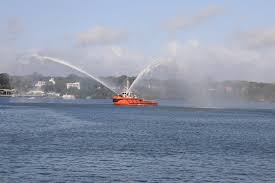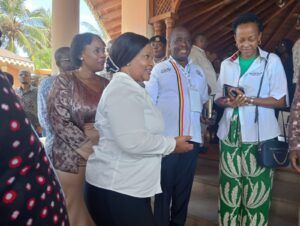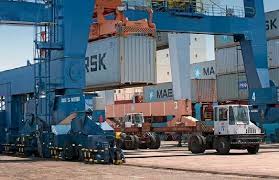Empowering Kenya’s Youth Through Maritime Education: A Call for Collaboration

Bandari Maritime Academy Chief Executive Officer, Dr. Eric Katana/. (Photo/ Courtesy)
By Andrew Mwangura
Email, thecoastnewspaper@gmail.com
The recent visit by Wundanyi Member of Parliament, Hon. Danson Mwashako, to the Bandari Maritime Academy (BMA) in Mombasa marks a significant moment in Kenya’s journey toward harnessing the potential of its Blue Economy.
Hosted by the Academy’s Chief Executive Officer, Dr. Eric Katana, the courtesy call was more than a ceremonial gesture; it was a clarion call for collaboration to empower Kenyan youth, particularly those from Taita Taveta County, with the skills and opportunities needed to thrive in the burgeoning maritime sector.
The discussions between the two leaders, centered on strengthening maritime education and training, reflect a shared vision of equipping young Kenyans to seize both local and international opportunities in the maritime industry.
This moment underscores the critical role institutions like BMA play in shaping the future of Kenya’s economy and the urgent need for stakeholders to rally behind this transformative agenda.
Kenya’s Blue Economy, encompassing maritime transport, fisheries, aquaculture, and coastal tourism, holds immense potential to drive economic growth and create jobs. With its strategic location along the Indian Ocean and a coastline stretching over 600 kilometers, Kenya is well-positioned to become a maritime hub in East Africa.
However, unlocking this potential requires a skilled workforce capable of meeting the demands of a rapidly evolving global maritime industry.
This is where Bandari Maritime Academy stands out as a beacon of hope. Established as a national center of excellence in maritime and shipping training, BMA has been at the forefront of equipping Kenyans with the technical know-how and certifications needed to compete on a global stage.
Hon. Mwashako’s visit and his commendation of the Academy’s efforts highlight its pivotal role in preparing young people for careers that promise not just employment but also economic empowerment.
The discussions between Dr. Katana and Hon. Mwashako focused on creating opportunities for the youth of Taita Taveta County, a region rich in potential but often underserved in terms of access to specialized education and training.
By prioritizing collaboration between the Academy and local leaders, the two envisioned a future where young people from Taita Taveta and beyond can access world-class maritime training, enabling them to secure jobs on ships, in ports, or within the broader maritime supply chain. This vision aligns with Kenya’s broader economic goals, as outlined in Vision 2030, which emphasizes the development of the Blue Economy as a key pillar of sustainable growth.
The maritime sector offers a pathway out of poverty for many young Kenyans, particularly those from coastal and marginalized regions, who often face limited employment prospects. By investing in their education and training, BMA is not just preparing individuals for jobs; it is fostering a generation of professionals who can contribute to Kenya’s economic transformation.
A highlight of Hon. Mwashako’s visit was the tour of BMA’s state-of-the-art training facilities, led by Dr. Katana and Assistant Director for Supply Chain Management, Samson Chira.
The tour showcased the Academy’s commitment to excellence, with cutting-edge equipment and programs designed to meet international maritime standards. The upcoming Maritime Survival Training and Certification Centre, which was a focal point of the visit, is a game-changer.
Once completed, this facility will position BMA as a regional leader in specialized maritime safety training, attracting students and professionals from across East Africa and beyond.
This development is a testament to BMA’s forward-thinking approach and its ambition to elevate Kenya’s standing in the global maritime industry. For young people in Taita Taveta and other parts of Kenya, this means access to training that is not only locally relevant but also globally recognized, opening doors to careers on international vessels and in maritime organizations worldwide.
Hon. Mwashako’s pledge to support initiatives that benefit students from his constituency is a welcome commitment. It reflects the kind of leadership needed to bridge the gap between opportunity and access, particularly for youth in underserved regions.
By advocating for scholarships, partnerships, and outreach programs, leaders like Mwashako can ensure that financial and logistical barriers do not prevent talented young people from pursuing maritime careers.

This collaboration between political leaders and educational institutions is critical to ensuring that the benefits of the Blue Economy are equitably distributed.
Too often, opportunities in emerging sectors remain concentrated in urban centers or among those with greater resources. By focusing on regions like Taita Taveta, BMA and its partners can create a more inclusive model of development, one that empowers communities that have historically been left behind.
The significance of this moment extends beyond Taita Taveta. The maritime sector is a global industry, and Kenya’s youth have the potential to compete on an international stage. However, this requires sustained investment in education, infrastructure, and partnerships.
BMA’s work is a strong foundation, but it cannot succeed in isolation. Government, private sector, and community leaders must work together to expand access to training, provide funding for students, and create pathways to employment.
The upcoming Maritime Survival Training and Certification Centre, for instance, will require significant resources to reach its full potential. Partnerships with international maritime organizations, shipping companies, and regional governments could provide the support needed to make this vision a reality.
Moreover, awareness campaigns are essential to ensure that young people, especially in rural and coastal areas, understand the opportunities available in the maritime sector and how to access them.
As Kenya looks to the future, the Blue Economy represents a frontier of opportunity.
Institutions like Bandari Maritime Academy are laying the groundwork for a generation of skilled professionals who can drive this sector forward. Hon. Mwashako’s visit and his commitment to supporting BMA’s initiatives are a step in the right direction, but they must be followed by concrete actions. Scholarships, internships, and mentorship programs for students from Taita Taveta and other regions can turn aspirations into reality.
Dr. Katana’s leadership and vision for BMA, coupled with the support of leaders like Mwashako, signal a bright future for Kenya’s maritime sector.
The challenge now is to maintain this momentum, ensuring that the youth of Kenya are not just spectators but active participants in the Blue Economy’s growth.
In conclusion, the courtesy call by Hon. Mwashako to Bandari Maritime Academy is a reminder of the power of collaboration in unlocking Kenya’s maritime potential.
By investing in education and training, and by fostering partnerships that prioritize inclusivity, Kenya can empower its youth to seize the opportunities of the Blue Economy.

The vision of a thriving maritime sector, driven by skilled and passionate young Kenyans, is within reach.
It is up to leaders, educators, and communities to work together to make it a reality, ensuring that the benefits of this sector ripple across the nation, from Taita Taveta to every corner of Kenya.
The author is a policy analyst specializing in maritime governance and blue economy development.





